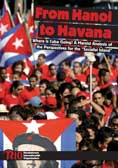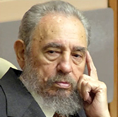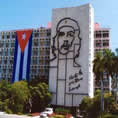



Archive for the Category 'Cuba'

 Cuba has never been a socialist society in which the working class manages the means of production democratically. Cuba has never seen any kid of proletarian democracy: no kind of workers’ and peasants’ councils with elected and recallable delegates, similar to the Soviet system established by the October Revolution in Russia and subsequently crushed by the Stalinist counterrevolution of the 1920s/30s. The Cuban bureaucracy had no need to carry out a political counterrevolution to crush organs of proletarian democracy because such organs simply did not exist: from the beginning it based itself on the Bonapartist state apparatus established before the expropriation of the bourgeoisie. “Castro, who in 1959 was a bonaparte for the enfeebled Cuban bourgeoisie was, by 1962, a bonaparte “for” the politically expropriated Cuban working class.”[12] »»»»
Cuba has never been a socialist society in which the working class manages the means of production democratically. Cuba has never seen any kid of proletarian democracy: no kind of workers’ and peasants’ councils with elected and recallable delegates, similar to the Soviet system established by the October Revolution in Russia and subsequently crushed by the Stalinist counterrevolution of the 1920s/30s. The Cuban bureaucracy had no need to carry out a political counterrevolution to crush organs of proletarian democracy because such organs simply did not exist: from the beginning it based itself on the Bonapartist state apparatus established before the expropriation of the bourgeoisie. “Castro, who in 1959 was a bonaparte for the enfeebled Cuban bourgeoisie was, by 1962, a bonaparte “for” the politically expropriated Cuban working class.”[12] »»»»
 read comments (0)
read comments (0)
 The Cuban Revolution began in 1917 with the October Revolution in Russia. During the first imperialist World War, the Russian working class, together with the poor peasantry, did not only overthrow the Czarist monarchy but also broke the power of the propertied classes. Led by the revolutionary workers’ party known as the Bolsheviks, the workers’ and peasants’ councils carried out a land reform without any compensation to the former owners and nationalized the industry under workers’ control. »»»»
The Cuban Revolution began in 1917 with the October Revolution in Russia. During the first imperialist World War, the Russian working class, together with the poor peasantry, did not only overthrow the Czarist monarchy but also broke the power of the propertied classes. Led by the revolutionary workers’ party known as the Bolsheviks, the workers’ and peasants’ councils carried out a land reform without any compensation to the former owners and nationalized the industry under workers’ control. »»»»

 When the guerilla assumed power, its program was based on the utopian vision of an independent Cuban capitalism, including a land reform to give land to poor peasants and decrease US influence in agriculture. Castro famously declared that the revolution was “not red but olive green” and in a visit to the United States in April 1959, he went even further: “I have said clearly and definitively that we are not communists. The doors are open to private investments that contribute to the development of industry in Cuba. It is absolutely impossible for us to make progress if we don’t reach an understanding with the USA.”[7] »»»»
When the guerilla assumed power, its program was based on the utopian vision of an independent Cuban capitalism, including a land reform to give land to poor peasants and decrease US influence in agriculture. Castro famously declared that the revolution was “not red but olive green” and in a visit to the United States in April 1959, he went even further: “I have said clearly and definitively that we are not communists. The doors are open to private investments that contribute to the development of industry in Cuba. It is absolutely impossible for us to make progress if we don’t reach an understanding with the USA.”[7] »»»»

 Cuba was historically dominated by imperialism, first as a colony of Spain and then as a semi-colony of the United States. The island gained independence in 1902, but the Cuban constitution included an amendment granting the United States the right to intervene militarily at any time until 1934. The political power of US imperialism had an economic foundation, since US companies owned a large part of Cuba’s land and industry. For example, US capital owned 35% of sugar production, alongside countless hotels and casinos, while the rest of the economy belonged to a small and slavishly pro-imperialist Cuban bourgeoisie[4]. »»»»
Cuba was historically dominated by imperialism, first as a colony of Spain and then as a semi-colony of the United States. The island gained independence in 1902, but the Cuban constitution included an amendment granting the United States the right to intervene militarily at any time until 1934. The political power of US imperialism had an economic foundation, since US companies owned a large part of Cuba’s land and industry. For example, US capital owned 35% of sugar production, alongside countless hotels and casinos, while the rest of the economy belonged to a small and slavishly pro-imperialist Cuban bourgeoisie[4]. »»»»

 Cuba seems like an anachronism in today’s world. Other formerly “socialist” states reintroduced capitalism in the upheavals of the 1990s. In Russia, the Communist Party was toppled and its system collapsed. In China and Vietnam, the Communist Parties themselves led a controlled process of reforms to reestablish a market economy. Cuba alone has maintained to this day an economy which is dominated not by the laws of the market but by a plan[1]. »»»»
Cuba seems like an anachronism in today’s world. Other formerly “socialist” states reintroduced capitalism in the upheavals of the 1990s. In Russia, the Communist Party was toppled and its system collapsed. In China and Vietnam, the Communist Parties themselves led a controlled process of reforms to reestablish a market economy. Cuba alone has maintained to this day an economy which is dominated not by the laws of the market but by a plan[1]. »»»»

 Beginning with the discussions about our “Basic Positions”, a debate about the nature of the Cuban regime opened up. Based on the article “Summer, sun and socialism?”, we want to continue this debate in an organized way. There are different opinions within REVOLUTION and we don’t want to hide this. We want to give both sides an opportunity to express themselves because this debate is going on in practically all left-wing structures. »»»»
Beginning with the discussions about our “Basic Positions”, a debate about the nature of the Cuban regime opened up. Based on the article “Summer, sun and socialism?”, we want to continue this debate in an organized way. There are different opinions within REVOLUTION and we don’t want to hide this. We want to give both sides an opportunity to express themselves because this debate is going on in practically all left-wing structures. »»»»

 50 years after the revolution – where is Cuba going?
50 years after the revolution – where is Cuba going?
50 years ago, in the night before January 1, 1959, the Cuban dictator Fulgencio Batista fled the country. The next morning, rebel troops under the young lawyer Fidel Castro entered the city of Santiago de Cuba. However, the Cuban Revolution was not only the work of a few thousand guerrillas. The students whose protests against Batista had closed down the country’s universities and especially the workers’ movement whose general strike had paralyzed the capital also played an important role in forcing the dictator to flee. »»»»
